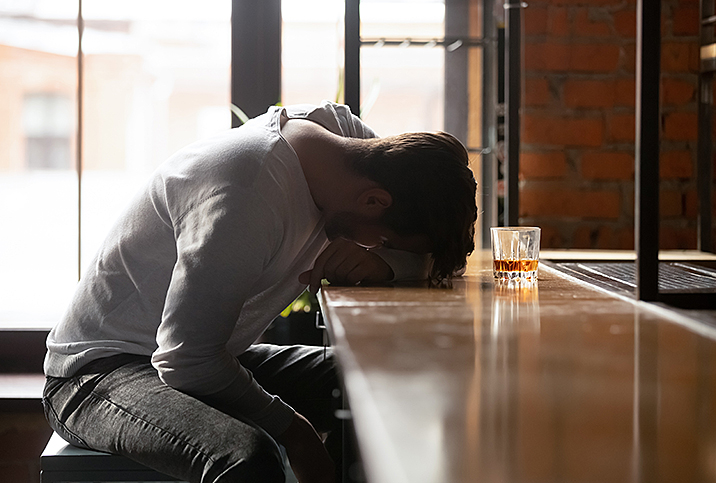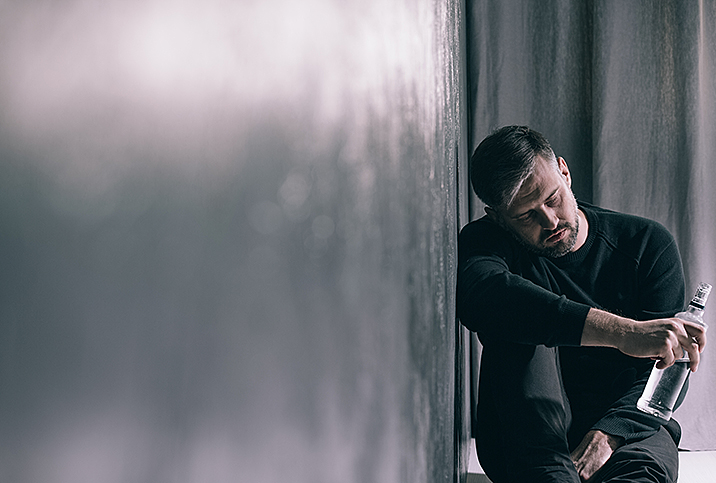Take the First Steps in Overcoming Your Drug or Alcohol Problem

You or a loved one may have a problem with substances like alcohol and drugs, but it's not a full-blown addiction, right? Not until you reach a gray area where your substance use has you starting to second-guess yourself:
"I have never had this much before. I wonder if anyone else has noticed?"
"My weekend use has spread from Fridays and Saturdays to Thursdays through Sundays. Is that acceptable?"
"Why am I unable to pay the rent this month?"
"Substance misuse has increased during the pandemic," said Alëna A. Balasanova, M.D., director of addiction psychiatry education at the University of Nebraska Medical Center. "People who previously used substances in a way that wasn't problematic are now starting to use them in a way that is."
In June 2020—just a few months after COVID-19 was detected in the United States—the Centers for Disease Control and Prevention (CDC) found 13 percent of Americans reported starting or increasing substance use to cope with pandemic-related stress. The numbers were highest among younger, racially marginalized adults and care workers, especially unpaid adult caregivers and essential workers, such as nurses. One study measured increased drug use by monitoring activity on Reddit drug forums.
Whatever your relationship with substance use, it's always helpful to check in with yourself and to learn about signs of substance-related issues, which aren't always portrayed in the media.
"There are smaller, more subtle signs to look out for," said Joseph DeSanto, M.D., an addiction physician in New Jersey who has struggled with drug use himself. He gave an example of intermittent heavy drinking, such as binge drinking on the weekends.
"That can be just as problematic as somebody who's a daily drinker," he explained. "In fact, it could be even more insidious."
When does it become a problem?
Balasanova recalled a patient who likely lived in the substance use/misuse gray area.
"They had always enjoyed a beer with friends and never had a problem," she said.
However, when the pandemic came around, he found himself drinking more and more until, eventually, use was constant.
"Again, he hadn't had even a remote idea that this would happen pre-pandemic," she explained.
Just recently, the patient was evaluated for a possible liver transplant, likely due to alcohol-related liver disease.
To ensure your substance use doesn't interfere with what you want in life or lead to chronic pain and suffering, Balasanova and DeSanto suggested three questions you can ask yourself to get a sense of whether you're heading into potential gray areas.
Does your use interfere with other areas of your life?
A simple sign that your substance use may be problematic is if it starts causing problems in other areas of life, such as relationships, hobbies, finances and work. This scenario could play out as fights with family, feeling depressed, incurring debt and/or losing your job, DeSanto explained.
"Say you really like to have a glass of wine with lunch," Balasanova said. "Maybe you have more than one and then you forget to pick your kids up from school."
But there are other ways substances can cause problems. They can take up a huge amount of time, and not just when you're using, Balasanova said. Cravings can also distract you from other tasks, and there's the time it might take to access the substance and recover from its effects, like withdrawal or hangover.
"If before it was a pleasurable, fun thing and now it's impairing your ability to live your life in the way you want, that's the biggest alarm bell," she noted.
Are you having trouble cutting down even when there are consequences?
Often when substances cause problems, people notice them, are frightened by them and cut down on their use.
"Once they get signs from their environment that this is not a good thing, they usually stop, slow down, pull back," DeSanto said. "Let's say someone is drinking and gets a DUI [driving under the influence]. That could scare them to a point where they make changes."
DeSanto said the main difference between a user and someone who may develop a substance use disorder (SUD) is that consequences don't lead to changes in use patterns for the person with a disorder, even if they want to change.
When someone gets two or more DUIs within days or weeks, DeSanto noted, "that's someone who's not listening to their better sense of judgment."
When judgment is overridden by impulsivity, that's a sign someone's use has possibly led to a substance use disorder, he continued.
Do you feel like you can't stop even though you want to?
Substance use becomes a problem when it leads you to live a life that you don't want and/or harms others. If you find your substance use is scaring you or you are using the substance more than you would like and are having trouble reducing its use, it may be time to consider outside help.
DeSanto recommended asking yourself a few questions and giving yourself honest answers:
- Are withdrawals severe enough to need to use again to relieve the pain?
- Are you drinking in the morning to eliminate shakes or stop vomiting?
- How is all of this impacting not only you but also the life you're living and the people around you?
He added that these are all questions you would be asked during the screening processes in rehabilitation centers.
Substance-specific matters
Before we talk about steps toward treatment, if needed, DeSanto suggested some substance-specific details to consider.
Prevalent legal drugs—such as alcohol and, in some places, cannabis—need to be distinguished from illegal ones, such as cocaine and methamphetamine, he explained.
Although taking illegal substances does not automatically make you addicted or mean you have a problem, DeSanto generally considers their use as a more serious sign. As for tobacco, cigarette smoking is the leading preventable cause of death, so any use is considered dangerous.
However, problematic use can be harder to parse out among more normalized drugs such as alcohol and cannabis. During the pandemic, many virtual events have centered around drinking, from Zoom happy hours to baby showers, and the line between work time and free time has blurred. In light of this, Balasanova said certain alcohol-specific questions may be particularly useful.
Focusing on alcohol, DeSanto often asks his clients if binge periods during weekends bleed into the week. He also asks about blackouts: how often they occur, if at all, and whether there have been any potentially dangerous outcomes from a blackout, such as having unprotected sex with someone you didn't know or falling and hitting your head.
Focusing on both alcohol and cannabis, his questions also get into relational, legal and financial consequences:
- Are you making purchases you can't afford?
- How are you impacting people around you?
- How is it all affecting how you want to live?
I think I have a problem. What now?
Considering the increased substance use and misuse during the pandemic, Balasanova recommended people be upfront and honest about these conversations without being judgmental.
People who needed substance use treatment before the pandemic have had more difficulty accessing it since the pandemic. It's harder to plan a physical trip to the doctor's office, rehabilitation and harm reduction clinics, and peer support groups such as Alcoholics Anonymous (AA) and SMART Recovery (although many developed a larger online presence).
If you think you or a loved one may have a substance-related problem, you can take concrete steps toward recovery. At the same time, Balasanova cautioned, substance use treatment is not one size fits all.
"There's no algorithm," she said. "It is highly tailored to the unique individual sitting in front of you."
If you believe someone you know has a substance use problem, your first concern is bringing up the subject, especially knowing it will be a difficult conversation. Balasanova recommended a few specific strategies.
"Number one: Try to come from a place of concern and compassion," she said. "You're not accusing the individual. You're not there to be aggressive or scare them into stopping. This idea of an intervention is completely false. I can't believe there's a whole TV show about it."
According to Balasanova, addressing the problem from a caring, less confrontational place makes the individual more likely to open up and seek help if they need it. A less aggressive opener might be something like: "Hey, I've noticed that you've been late to work every day for the past few weeks and I'm just worried about what might be going on. Is there anything I can do to help?"
Don't pry or make accusations. If the individual is ready to talk about it, they will.
"The important thing is that you did express your concern," she added. "If and when they will be ready, they'll know to come to you because you've already made it clear that it's a judgment-free space."
Steps toward treatment
If and when you or your loved one wants to make a move to seek help, Balasanova said, effective help is available.
"Substance use disorders are really treatable mental health disorders," she explained.
The first step could be mentioning the issue to a healthcare provider, such as your primary care doctor, as they can connect you with resources, suggest various organizations that provide information and support, and refer you to a specialist.
If you don't want to tell a doctor, or don't have one, Balasanova suggested looking up peer support groups online, such as AA or SMART Recovery, though there are many more, including Moderation Management and Recovery Dharma. But keep an open mind if you do decide to go to an AA-like group, she cautioned.
"Historically, everybody always pushed everybody into AA, whereas for a lot of people, that's just not going to work," she said, explaining some people have told her that listening to other people's problems actually drives them to drink more.
"Bottom line, we need to normalize substance use disorders as just another medical condition so that people talk openly about them and get help if needed," Balasanova said. "People maybe have this negative idea that when you have a SUD, the world is over. But this certainly isn't true. Recovery is not just possible. It's probable if you actually receive the treatment that you need."




















